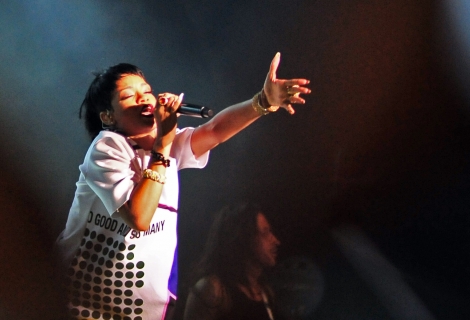#ScienceGrrl Speed Mentoring: Who championed you?
Posted on July 30, 2014
0 people commented on this

We love a good discussion, us. And if one thing’s got tongues wagging of late, it’s some music videos a little heavy on the nudity and simulated sex.
If you haven’t seen Miley Cyrus’ ‘Wrecking Ball’ YouTube sensation (and we’d forgive you if you hadn’t), in the name of informed debate, you can watch it here. If you don’t like that one, we definitely don’t recommend you watch this – (courtesy of Rihanna).
It seems many musicians have been competing for music video ‘shock factor’ for years. Remember Christina Aguilera’s ‘Dirrrty’ (yes, that’s three Rs – we counted) way back in 2002? That’s not exactly tame stuff, but the recent offerings really take the biscuit in terms of raw nudity and getting about as close to sex as you can without actually having it. So what does this new level of sexualisation actually mean?
You may not have followed the open letter/Twitter to-and-fro, started by Sinéad O’Connor to Miley Cyrus, where the former advised Miley not to let the music business "make a prostitute of her". Annie Lennox also chimed in with the debate, rather elegantly letting rip on what she sees as 'highly styled pornography with a musical accompaniment' and 'a gloretised and monetised form of self harm.' The emphasis here was on objectification – that these women are becoming the object of a patriarchal society’s gaze. But she focused, ultimately, on children: arguing that we cannot ignore the fact that children comprise a vast number of these pop idols’ fans, and that children are the ones 'barraged by market forces exploiting the “normalisation” of explicit sex in underage entertainment.'
There are, however, some familiar arguments for this kind of demonstration of sexual liberation: here is a pretty good example. Evette Dionne says that she admires Rihanna 'because she performs womanhood however she pleases, despite the centuries of oppression attached to her black female identity. She doesn’t place boundaries on her sexual expression, which is important for other young black women – like me.' And Miley Cyrus’ defenders, of which Paul McCartney is one, argue that she’s a young woman expressing herself.
And then there’s the argument that these women are the ones in control – that they're not passively being taken advantage of but rather actively taking advantage of the music industry and the society that everyone says is exploiting them. They’re laughing all the way to the bank while we squabble over whether they’re suitable role models.
Enough from us. Over to you. Do you think these videos are taking it too far? Do you think children are paying the price here – and that pop stars are responsible for the impressions of their fans? Or are these women expressing themselves, and should we be glad we live in a society where they can do so freely? Are these videos just the most modern – and therefore, least socially acceptable – form of (dare we say it) feminism?
We’re sorry to announce that – shock horror! – there is no WISPchat to get your teeth into this afternoon. But dry your eyes, assess your views and send us a tweet to let us know if you’d like to chat in future about whether some modern music videos are taking it a bit too far. @whatiseeproject is our name, considered debate is our game.
Image source - Flickr: Michael Gethen
Comments
0 Comments - Be the first
Comments